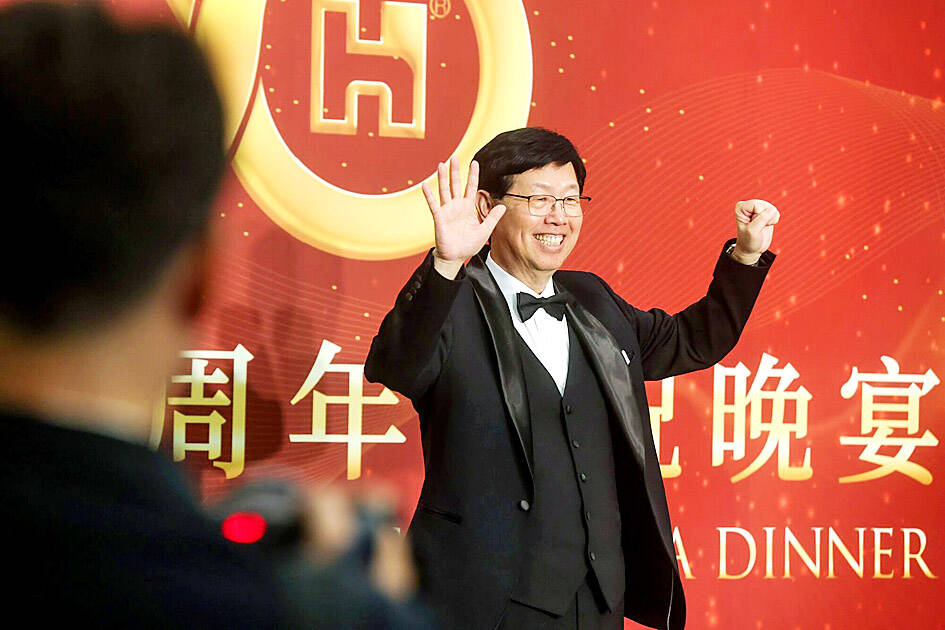Hon Hai Precision Industry Co (鴻海精密), the world’s largest contract electronics maker, is expected to forge deeper and more comprehensive collaborations with its main customer Apple Inc, the company’s chairman said on Tuesday.
Speaking before a dinner banquet on Tuesday to mark the company’s 50th anniversary, Hon Hai chairman Young Liu (劉揚偉) said that the two companies would forge a deeper and more extensive partnership.
“Everything that should be there will be there and nothing will be missed,” Liu said, when asked about the progress made in Hon Hai’s collaborations with Apple in the artificial intelligence and electric vehicle (EV) fields.

Photo: Chang I-hwa, Bloomberg
Hon Hai is the largest assembler for Apple. In addition to iPhone, it makes other Apple products, such as iPads, MacBooks, AirPods and Apple Watches. It gets more than half of its business from Apple.
Liu said that aside from Apple, several of Hon Hai’s international partners also dispatched representatives to the banquet, including its other main customers HP, Dell, Cisco, processor and chip makers Intel, NVIDIA, AMD and Arm, and automotive chipmaker NXP.
Asked about Hon Hai’s plans to expand its footprint overseas, Liu said that it is continuing its collaboration with India’s HCL Group in semiconductor outsourced assembly and testing (OSAT) development in the South Asian nation, and is in negotiations with the local government on issues regarding subsidizing semiconductor manufacturing.
Construction of an EV factory in Thailand has almost been completed and Hon Hai will determine when to begin taking orders depending on future market development, Liu said.
Asked about Hon Hai’s plan to set up a joint-venture company to build and operate a new 12-inch wafer fab in Malaysia, Liu said that a worldwide chip shortage has prompted chipmakers in many countries to accelerate building new factories to increase manufacturing capacity.
However, as upstream supply relies heavily on downstream demand, Liu said Hon Hai would decide whether to go ahead with a Malaysian wafer fab by observing downstream demand.
“Does the world need so many fabs?” Liu said.
Liu added that Hon Hai was not sure yet and would continue to pay attention to the issue.

Sweeping policy changes under US Secretary of Health and Human Services Robert F. Kennedy Jr are having a chilling effect on vaccine makers as anti-vaccine rhetoric has turned into concrete changes in inoculation schedules and recommendations, investors and executives said. The administration of US President Donald Trump has in the past year upended vaccine recommendations, with the country last month ending its longstanding guidance that all children receive inoculations against flu, hepatitis A and other diseases. The unprecedented changes have led to diminished vaccine usage, hurt the investment case for some biotechs, and created a drag that would likely dent revenues and

Macronix International Co (旺宏), the world’s biggest NOR flash memory supplier, yesterday said it would spend NT$22 billion (US$699.1 million) on capacity expansion this year to increase its production of mid-to-low-density memory chips as the world’s major memorychip suppliers are phasing out the market. The company said its planned capital expenditures are about 11 times higher than the NT$1.8 billion it spent on new facilities and equipment last year. A majority of this year’s outlay would be allocated to step up capacity of multi-level cell (MLC) NAND flash memory chips, which are used in embedded multimedia cards (eMMC), a managed

CULPRITS: Factors that affected the slip included falling global crude oil prices, wait-and-see consumer attitudes due to US tariffs and a different Lunar New Year holiday schedule Taiwan’s retail sales ended a nine-year growth streak last year, slipping 0.2 percent from a year earlier as uncertainty over US tariff policies affected demand for durable goods, data released on Friday by the Ministry of Economic Affairs showed. Last year’s retail sales totaled NT$4.84 trillion (US$153.27 billion), down about NT$9.5 billion, or 0.2 percent, from 2024. Despite the decline, the figure was still the second-highest annual sales total on record. Ministry statistics department deputy head Chen Yu-fang (陳玉芳) said sales of cars, motorcycles and related products, which accounted for 17.4 percent of total retail rales last year, fell NT$68.1 billion, or

In the wake of strong global demand for AI applications, Taiwan’s export-oriented economy accelerated with the composite index of economic indicators flashing the first “red” light in December for one year, indicating the economy is in booming mode, the National Development Council (NDC) said yesterday. Moreover, the index of leading indicators, which gauges the potential state of the economy over the next six months, also moved higher in December amid growing optimism over the outlook, the NDC said. In December, the index of economic indicators rose one point from a month earlier to 38, at the lower end of the “red” light.